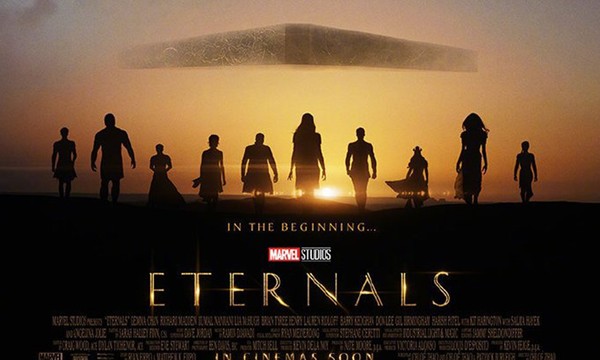A movie featuring ten heroes, alien monsters, and an omniscient cosmic threat to Earth. Sounds familiar? Surprisingly, it’s not The Avengers; it’s Eternals. Directed by Chloé Zhao, Eternals is an epic superhero movie that features heroes unlike ever before, while successfully extending the scope of the Marvel Cinematic Universe.

A notable achievement about Eternals is that it incorporates the concept of diversity with characters representing a variety of ethnicities that break stereotypes of the movie industry. The protagonist is not the usual white male adult of European descent. There are no “smart Asian nerd” and “jazz-loving entertaining African-American” acting as sidekicks for the “cool and handsome Caucasian American” — stock characters present in other Marvel movies like Ned in the Spider-Man movies and Wong in Doctor Strange. In Eternals, Gilgamesh is Asian, but shows strong power from his bulky muscles. Phastos is African-American, but is an intelligent engineer who can fix a completely broken spaceship. More significantly, the incorporation of diversity is not limited to ethnicity. Eternals features heroes that are homosexual (Phastos), disabled (Makkari), underage (Sprite), and female, all of which used to be underrepresented in previous superhero movies. In previous Marvel movies, only two out of 13 Avengers were female. In Eternals, it's half and half, successfully breaking the frame of white male dominance of superhero roles.
Yet, while Zhao managed to create an universe with diverse characters, she was limited in developing them. To put it simply, Zhao had too many ideas for a 2.5-hour-long movie. Though longer than typical movies, it is still too short for the audience to empathize with the many protagonists. The characters’ feelings are not presented through scenes and actions, but through direct explanations by other characters. For instance, Sprite’s emotions towards Ikaris, which is a central point of the movie, is revealed by another character, Kinko. But this is trivial compared to other parts of the movie, where explanations are not even provided. Hence, confusion builds up about why characters act a certain way, reaching its peak when Ikaris’s last actions completely baffle the audience.
Weak character development was mainly due to the lack of drama for the audience to empathize. In the movie, Sersi, being selected to lead the team, no doubt has a key role in the team and the plot. Yet, she was not given any more importance than the other Eternals, weakening her appeal to the audience. She was selected as a leader because of her apparent “love for humanity”, which, again, had to be explained by other characters from the beginning. There is little reason for the audience to empathize and love her more than the others. But the iconic MCU “Big Three” (Iron Man, Thor, and Captain America) were loved even among an extraordinary group of heroes for their unique characters, coupled with a story that allowed them to develop with the audience. Iron Man, for example, was a multi-millionaire military corporation CEO who was egoistic and arrogant. But he learned to sacrifice, to listen to others, and to pursue the benefit of others. The audience gets to watch him grow and become a hero. Likewise, other beloved Marvel heroes did not start as heroes. Thor was an arrogant prince and a war-freak. Captain America was a stubborn principlist who used to get beaten up in the back alley. But Thor gave up the throne for his people; Captain America learned to look back on his mistakes. There is no such drama in Eternals. Sersi just loved humans. She had her powers from the beginning. There are attempts to show why she is an appropriate hero, but they were not convincing enough.
But the protagonists have it easier — the villains have even less charisma. The “Deviants” do not live up to the standards of a villian. They neither provoke the protagonist to develop, nor do they have that menacing quality. There are only a few moments of them trying to do evil, but most of the time, they just get beaten up by the Eternals. What escalates the pity for them, is the fact that they, too, were just victims of another villain’s greater scheme. The audience cannot feel catharsis when such backstory exists. Furthermore, in the end, it turns out the main story could have existed — and be more focused — without them.
To conclude, Eternals is a new ambitious challenge Marvel has undertaken. It presents a level of diversity that was hard to see in previous Marvel movies. Yet, with such limited character development, this new attempt is unlikely to be well-received by the public. It seems that Zhao recognized such problems as well, sprinkling explanations of the story throughout the movie. Nevertheless, it is a shame that such an important attempt towards diversity may not turn out to be successful. Were Eternals to fail, Marvel may be reluctant to try such a new concept again and return to the old standard types. We can only hope her next attempt will be more satisfying.

